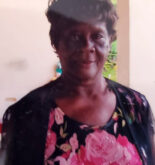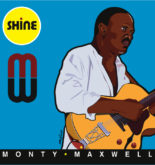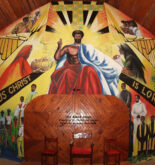Born and raised in Vieux Fort, the southernmost town of St. Lucia, a hotbed of reggae and dancehall music, Alleyne “Ally Kyatt” Augustin Collymore is one of St. Lucia’s best known dancehall artist. A versatile and prolific songwriter and a free style folk hero, he got his first inkling of song writing in primary school where he found out what great fun it was to write poems with rhyming lines. Soon he was able to put his poetic and rhyming skills to good use at community parties and sessions where he and his pals were encouraged to hold the mic and free style. Ally Kyatt’s impromptu, free style performances brought him immediate attention and praise and singled him out as the most talented of the neighborhood youngsters.
By his mid to late teens Ally Kyatt was writing several songs per day and had teamed up with other budding artists to record a song or two. However, an early milestone in his music career came in 2000 at the age of twenty when veteran reggae artist and music guru, Sylvester “Itoobaa” Peter, asked him to do a combination, Dread and The Beast, for what would turn out to be Freedom, a history-making album still regarded as the best reggae album produced in St. Lucia. By then Ally Kyatt was a Dreadlocks Rastafarian, living a life of austerity and meditation, and composing and performing conscious reggae and dancehall music.
In his mid-twenties, Ally Kyatt’s lifestyle changed drastically and so did his art. He rid himself of his dreadlocks and moved away from a lifestyle and religion of austerity to one of indulgence and feting. And so his art changed from conscious reggae-dancehall and lyrics eschewing iniquity and corruption to party music and to songs poking fun at the hypocrisy and idiosyncrasy of his society.
In his newly transformed lifestyle and artistic sensibilities, Ally Kyat arrived at another milestone in his career. Andrew “Yardie” Haynes, a veteran reggae, dancehall and prize-winning soca artist, who has enjoyed some measure of national and international success, and who some regard as a St. Lucian cultural phenomenon, established Hotness International, a production house, record label, and promotion house, all in one. Ally Kyatt was signed as Hotness’s biggest artist, and so had ready access to recording facilities and producers, and his music gained greater airplay.
Equally significant, as the main artist in Hotness’s stable, Ally Kyatt was a featured artist at all of Hotness’s shows. In the three to four years following the formation of Hotness, Ally Kyatt and the rest of the hotness crew put out a string of hit songs that found audiences not only in St. Lucia but also in the French Caribbean islands and in parts of North America and Europe. Ally Kyatt’s national publicity gain new heights and for the first time in his music career he was earning regular income from his music, and thinking of himself as a professional artist.
It was at one of Hotness’s shows, held in Ally Kyatt’s hometown of Vieux Fort with Busy Signal, an international reggae-dancehall artist as headliner, that Ally Kyatt arrived at yet another milestone in his career. In the weeks preceding the show, Ally Kyatt and Crocodile, another prominent St. Lucian dancehall artist, fought a lyrical battle, taking turns pelting chat at each other in songs played on the airwaves. The war culminated in an impromptu freestyle clash between the two artist at the Busy Signal Show, just before the Jamaican superstar came on stage.
Surprisingly, the clash, unplanned, took center stage and relegated Busy Signal, supposedly the main act, to a side show. Ally Kyatt was hailed the winner of the clash and thus the king of St. Lucian dancehall, and instantly he was transformed into a folk hero, a cult figure, whom the island’s youth took to emulating and of whom parents kept asking “Who is this Ally Kyatt everyone talking about?” It was one of the defining moments in St. Lucian dancehall history. Overnight Ally Kyatt became a household name and the most sought after artist in St. Lucia.
If art is a reflection of the life of an artist, and if in its purist form art is an expression of what an artist has inside of him, then Ally Kyatt is one of the purest of St. Lucian artists. And this no doubt helps explain his phenomenal appeal as an artist. He is for real. His music is a revelation of the life he lives. Another feature of his art that has contributed to his success is his stage charisma. Slim and of average height, many would pass Ally Kyatt by without taking notice of him. But on stage the script changes completely. Suddenly he is transformed into a larger than life figure, compelling your attention, holding you transfixed. Yet another facet of his appeal is his storytelling: all his songs are stories, each verse an episode, each line a punch line, an epiphany. Humor, comedy, wit, and the idiosyncrasies of his creole culture are the tools of his trade. He is a folk story teller disguised as a reggae-dancehall artist.
In recent years, Ally Kyatt’s Vieux Fort community has been the theatre of gang warfare, with the latest episode leaving eleven dead in its wake. It is fitting that Vieux Fort’s very own folk hero has stood up to the challenge of gang violence with what he does best. In Vieux Fort Rising Again, his latest, and what may well be his most gut-wrenching song, he has called for peace and unification.
One Vieux Fort, One District Six
From the North to the South
From the West to The East
Vieux Fort I go rise again
We done been thru de struggles
And we been thru de pain
But we will rise again
For the future generation and the little children
We have to rise again
Politicians and Police
We doh know who ah go do it
Things rough in ah de streets
And the people dem ah bawl for peace
Me proud of de place where me from
That ah Vieux Fort Town
It eh perfect but me love it
Cause are dere so man born
From the airport to the wharf back to the fisheries pond
De bo lawi ah one, they call us Vieux Fortians
I remember when de mangue used to link with Shantytown
And every Sunday morning was football in de savanne
Long before dey give us guns and divide us in ah gangs
To kill one another like we stupid and dumb
Even the church and dem close cause …
So me call Malaki tell him to bring the binghi drum
Ley we chant some songs for unification
Why you think they call us Vye Fo (Vieux Fort)
Because we stay strong
From the mangue to Shantytown, Roots Alley to the Square
Westside, Laboushi, Bacadere
All Vieux Fortians just put your hands in ah de air
And let me sing this loud and clear
![]()



